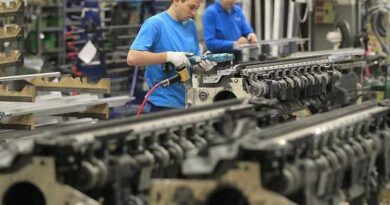‘I’m furious that we can’t reopen’
 Image copyright Vanita Parti
Image copyright Vanita Parti Gyms, nail bars and various other businesses in England were disappointed last month when the government failed to give them the go-ahead to open at the same time as pubs and hairdressers.
Now the government has given them new guidance – but it’s not as straightforward as it initially seemed.
Beauty salons, tattooists and tanning salons can reopen from Monday 13 July.
Gyms, indoor swimming pools and leisure centres will have to wait until Saturday 25 July.
But in the wake of the government’s announcement, it has emerged that not all forms of beauty treatment have been approved.
Vanita Parti is founder and chief executive of the Blink Brow Bar walk-in beauty bar chain, which has 11 shops in London.
At first, she welcomed the announcement as «fantastic news», but then she got an email from the British Beauty Council telling her that no treatments on the face will be permitted.
This includes eyebrow treatments, one of her company’s specialities.
«I’m furious,» she told the BBC. «We can’t reopen. Trimming a man’s beard is acceptable, but not doing a woman’s eyebrows, when both are wearing masks. This will kill so many businesses. I wish they’d consulted us.»
Which beauty treatments are still not OK?
- Face waxing, sugaring or threading services
- Facial treatments
- Advanced facial technical (electrical or mechanical)
- Eyelash treatments
- Make-up application
- Dermarolling
- Dermaplaning
- Microblading
- Electrolysis on the face
- Eyebrow treatments
Source: Department for Business, Energy and Industrial Strategy (BEIS)
Ms Parti was already feeling the loss of business from not being able to reopen earlier in the month.
«We had to cancel 2,000 appointments in the first week of July, That’s £3,000 that we had to write off,» she said.
«A lot of people have escaped on holiday and they were looking forward to getting a beauty treatment before they travelled, which they didn’t get.
Suntan saviours?
The UK’s biggest tanning business, the Feel Good Group, with more than 90 tanning salons and more than 400 staff, is allowed to reopen next Monday, but questions why it took so long.
Adam Mooney, group’s founder and chief executive, said: «While we welcome the decision to finally allow us to reopen, the government could have allowed us to open last week, when hairdressers reopened.
«We are ready to reopen today, not next week.»
Mr Mooney added: «More than 90% of our staff are women, and most in the 18 to 25-year-old age group, which is the demographic which has been worst hit financially by the pandemic, and they are very keen to get back to work.»
However, he anticipated keen demand, given the recent «dismal» weather in the UK and the difficulties in travelling abroad.
«Perhaps our tanning salons will be the suntan saviour of staycationing Brits this summer,» he said.
‘Welcome relief’
Indoor gyms and swimming pools will have to wait a little longer before they can reopen, although outdoor facilities can reopen from this Saturday.
Huw Edwards, chief executive of health body UK Active, told the BBC that the government’s announcement brought «welcome relief» for his members.
He said many gym owners and staff had felt «understandable frustration» not to have been included in the first wave of lockdown easing, but added: «We are where we are.»
Mr Edwards said the reopening of gyms was «an important moment for the health of the nation».
«This is a health crisis, so we now look forward to playing our central role – using our facilities and staff to help combat Covid-19 by strengthening the physical and mental health of people in every community.»
However, he said that like the hospitality industry, the fitness industry would be looking for «urgent financial and regulatory support from the government to ensure that reopening is financially viable, both for private and public operators».
Rob Ward, who runs YourGym, an independent fitness centre in Lytham, Lancashire, says he is ready to welcome people back to work out from 25 July, but they will find there are some changes.
«They’ll be noticing lots more sanitising stations around,» he says, while equipment has been moved to comply with social distancing rules.
«We’ve got our own app and they’ll have to book their space to avoid congestion at busy times.»
The only trouble is that he’s not quite sure yet what time of day that peak demand is likely to be.
«We think there will be a new normal. The busy times then may not be the busy times now,» he says. «People still on furlough may be more flexible with their time.»
Mr Ward’s staff are returning from furlough, so they will have to get used to that «new normal» as well.
«Everyone’s on a learning curve when they get back,» he says.
«The journey will be a little different, there will be time between classes, so it’s not exactly as it used to be, but we will adapt.»

